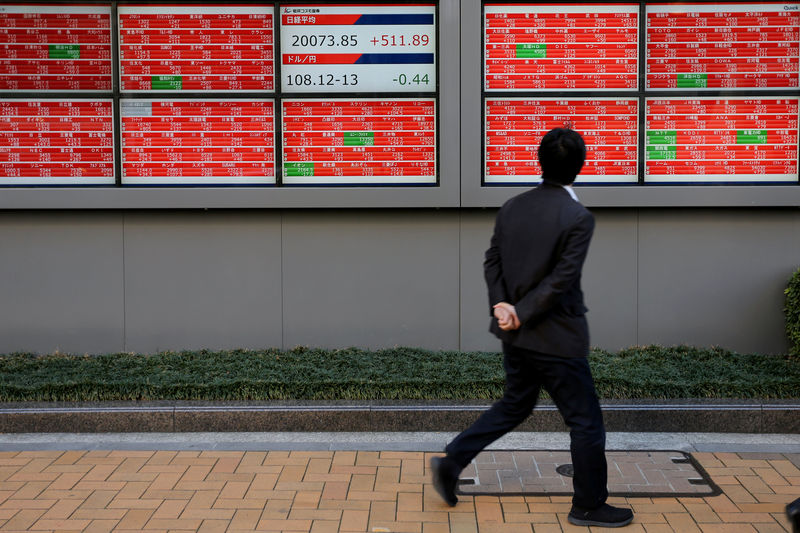By Ayai Tomisawa and Alun John
TOKYO/HONG KONG (Reuters) - Japanese share buybacks have hit a record this fiscal year and are set to maintain the booming growth as cash-rich companies bow to pressure from investors and the government to boost returns and improve governance.
In recent weeks, SoftBank Group Corp, Sony, Itochu Corp and other companies have announced plans to buy back shares worth more than 1.3 trillion yen, bringing the total value of buybacks flagged since April 1 to over 6.5 trillion yen ($58.92 billion).
That is already the most for any fiscal year since 2003 when the current buyback rules were introduced, according to financial data service firm I-N Information Systems.
Japan Buyback: https://tmsnrt.rs/2E9ABPV
Investors have long criticised Japanese companies for hoarding cash rather than investing it or returning it to shareholders, pushing down their returns on equity (ROE), a measure of the amount of profit a company generates from the money invested in it.
Buying back shares reduces a company's equity base, boosting its ROE.
"This past month has seen a lot of very positive shareholder-friendly activity from a wide array of Japanese companies," said Seth Fischer, founder and chief investment officer of Oasis Management, citing actions by SoftBank, Sony, Haseko, Tokyo Tatemono and Toppan Printing.
"To attract foreign investors, companies should continue this path of increasing shareholder returns, while continuing to improve their corporate governance."
Activist investor Oasis, among others, has been vocal in urging Japanese companies to boost returns. In December, Oasis failed to block the sale of Alpine Electronics to its larger affiliate Alps Electric, but Alps did announce a 45 billion yen buyback in January, the third largest buyback that month.
Japan Inc is under pressure to appease foreign investors after they sold 13 trillion yen of Japanese stocks in 2018, more than four times the net sales in 2015 and 2016, and a sharp reversal of the net 1.9 trillion yen bought in 2017.
"Recently, the global economy is weak and the Japanese market has fallen as foreign fast money has been selling aggressively,” said Archibald Ciganer, co-head of Japanese equity at money manager T.Rowe Price.
“But those Japanese companies that have good governance are taking advantage of cheaper stock prices and putting a floor under their stock price through buybacks.”
Share buybacks have had political pushback elsewhere. In the United States, Senator Marco Rubio last week announced plans to tax buybacks in an effort to encourage companies to reinvest spare cash instead of returning it to shareholders.
In Japan, though, policy makers have been urging companies to pay more attention to the wishes of investors, most notably through the country's corporate governance and stakeholders codes. Guidelines released last year urged firms to focus on their financial management policies, including the amount of cash they had on hand.
According to Ministry of Finance data, Japanese companies had internal reserves worth a record 446.5 trillion yen at the end of their latest fiscal year.
Japanese companies' ROEs are expected to fall below 10 percent this fiscal year for their first decline in three years, according to Nomura Securities.
"Many Japanese companies simply have too much cash on their balance sheets weighing down their ROEs. Better capital structure management is definitely needed," said Kin Chan, chief investment officer of Argyle Street Management.
Foreign investors outflow: https://tmsnrt.rs/2BMtYl1
A revision to Japan's corporate governance code last year, designed to push companies to sell stakes in other companies, is also driving buybacks.
"Dissolving cross shareholdings, and increasing dividends and buybacks are two ways to make Japanese companies more attractive to foreign investors," said Patrick Moonen, principal multi asset strategist at Netherlands-based NN Investment Partners.
Further buybacks are expected. Analysts at Goldman Sachs (NYSE:GS) predict that buybacks will reach 7.8 trillion yen for the 12 months to the end of March 2020.
Currently, 56 percent of Japanese non-financial companies in the benchmark Topix index sit on net cash - meaning they have funds left over even if they paid all debts tomorrow. That compares with less than 20 percent in the United States or Europe, according to figures from brokerage CLSA.

“I tell investors that the presents are still under the Christmas tree," said Nicholas Smith, CLSA's Japan strategist.